
Excellences, Heads of State and Government,
Diplomats, Government representatives,
Dear guests, Colleagues,
I sincerely welcome all the old and new friends to Vilnius in general, and to our old university in particular, to discuss regional, European and global issues and challenges of today and tomorrow.
Since we are in the cradle of classical culture and science, let me begin my speech by reiterating a well-known Latin motto: tempora mutantur, et nos mutamur in illis. Times are changing and we are changing along with them.
Times are changing, indeed. I recollect my visits to this University on multiple occasions. I can remember several decades of such visits. They were also decades of history of Lithuania, Europe, and the world at large.
I must confess that many things held more promise in the past. Moreover, our hopes were well-founded. The world seemed to be a more peaceful and stable place, and people seemed to generally have a better understanding of the conditions for their survival. This was the time of active European integration, with Lithuania being in the right place at the right time in the process. From a candidate country it marched all the way towards EU membership, smoothly taking on the role of a regional leader at a later stage. Our large Eastern neighbour also seemed to be oriented towards European traditions and value-oriented policy bent to lead to democracy. The relations between Lithuania and Poland were praised both in Central Europe and worldwide as a global benchmark of peaceful cooperation between historic neighbours based on mutual respect.
Today, all is different. Unfortunately, the situation is diametrically different: Europe is trying to forge itself anew and resist fragmentation. Russia pursues the “divide and rule” policy in Western Europe, organises cyber-attacks worldwide and openly annexes the territories of its southern neighbours. Russia also supports authoritarian regimes and provokes conflicts in the Middle East. Most disgracefully and sadly, within mere several years, the relations between Lithuania and Poland have fallen from mutual trust and respect to the level of accusations, complaints, mistrust and escalation of old grievances. Moscow may use it as yet another gift.
What next? What is ahead of us if we fail to act, communicate and discuss problems? What happens if we continue living in the illusion that all is well? The world today is a small, integral and, therefore, very vulnerable place. A purely local issue, wherever it happens to take place – be it in Syria, North Korea, or our European neighbourhood – can ignite a full-scale global conflict.
Therefore, we need the ability to engage with each other, and a strategic and value-based approach to our future. I believe that our meeting today marks the beginning of a strategic dialogue. I am therefore grateful to all those who responded to the invitation to meet and discuss the future vision; a vision of renewed and extended success for decades to come; a vision that unites leaders and opens the door to new generations of free Europeans in the region.
When I refer to the era of success of this region and Europe at large, I can see Lithuania as an important stakeholder in the process. Jointly with Poland and post-soviet countries, Lithuania made an impressive record in attaining results and reaching a number of strategic objectives. We are doing our best to preserve our achievements. However, we must admit that we are far less involved in shaping foreign and security policy agendas in the region and that we are gradually losing out on initiative and leadership. Our tactical achievements in individual spheres are too minor to outweigh the strategic losses and the lack of vision in the region and in Europe.
We have to openly admit that Putin is growing increasingly successful in halting the forward march of freedom initiated by President Ronald Reagan and pursued until the era of President George Bush. Putin’s intentions of stifling the US leadership and establishing a multipolar unstable world are becoming an unwelcome reality today.
Decades of hesitant negotiations with the North Korean regime have produced a negative result: apart from developing nuclear weapons, the country has also developed ballistic missile systems, Concurrently, Russia and China are manipulating the situation to reach their own aims.
A lack of determination in Syria has caused the problem of massive migration to Europe, at the same time opening the door for direct Russian intervention and downgrading of the US and the EU.
For maintaining global security and democracy, clearly visible and tangible US leadership is key. The determined position of the current US Administration on crises in North Korea, Syria, Venezuela and elsewhere as well as the united position of the US Senate and the House of Representatives on sanctions to Russia are important and promising signs of the onset of a new wave of US leadership.
Russia invaded the sovereign states of Georgia and Ukraine in the 21st century. Both the US and EU failed to take every possible step to protect the countries from occupation and annexation of some of their territories. Notably, the battle on that front is not over yet. And, provided there are no new Munich plots and the transatlantic community adheres to a principled and strong position, Russia will be obliged to withdraw.
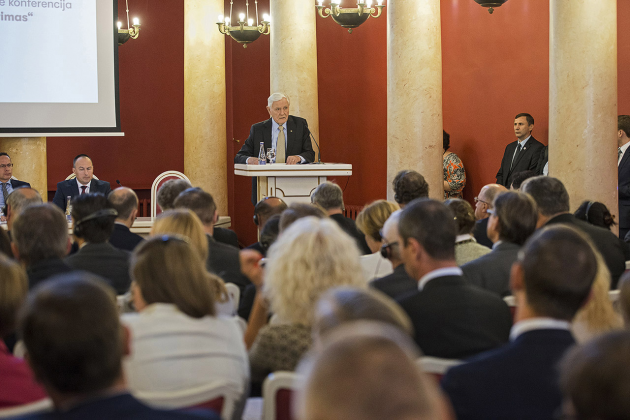
We should be deeply concerned about the destiny of Europe which is fighting for its freedom and leadership, or, to be more precise, for what is left of it. I am surprised to see some EU leaders take over Putin’s rhetoric and even defend his interests, while failing to protect the European aims and unity. I will refrain from mentioning the Druzhba pipeline project discontinued back in 2006, but the betrayals of our values in the cases of Nordstream 1 and 2 deserve a separate mention.
The pending Brexit will certainly deprive Europe of a substantial part of political might and strategizing capacity. I would not consider Brexit to be the final and irrevocable fact. However, instead of seeking to punish the UK at any cost, the EU leaders should first and foremost search for a solution and develop a new joint vision and new forms of coexistence. The EU will not be able to continue in its former business as usual format, plighted by technocracy and a clear democracy deficit.
All I can say about Lithuania, by contrast, is that, more than ever, it demonstrates a failure to agree with its natural strategic partners and neighbours. We are no longer creating alliances of common interest; we are increasingly lonely with our inferiority complex. Instead of putting an emphasis on cooperation, we promote the illusionary national policy of resistance to various dictatorships. We engage in allegation and accusation policy, instead of pursuing the policy of coordination of interests.
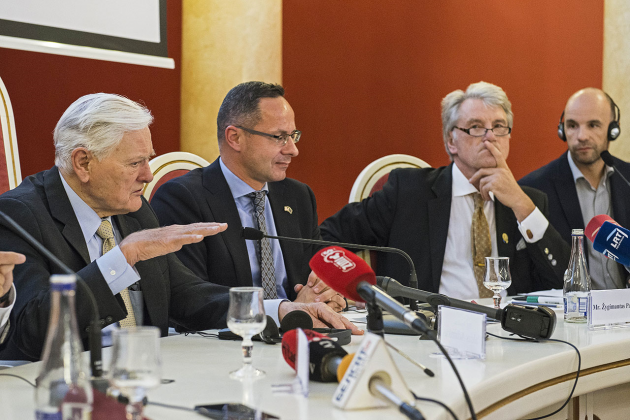
Something is wrong here, if we are losing friends both in Central European capitals as well as in Riga and Tallinn. Even the Baltic countries do not support us on essential energy matters. Russia is constructing a nuclear bomb in near vicinity of Vilnius through exploiting Belarus, yet we are unable to convince the EU Member States to perceive our concerns. Moreover, we are even unable to come to an agreement with our closest neighbours.
I am not naive and I have no illusions. Similarly to all of you, I understand that in the short-term we will not become friends with Kremlin. I am convinced that during the next pre-election period in Lithuania we will hear a number of proposals to adopt a more pragmatic stance, pursue our own interests, or, in other words, return to realpolitik in our relations with Russia. However, Lithuania knows only too well from its history and its current situation that the concept of realpolitik in most cases comes from the vocabulary of propaganda rather than political science. It most often serves as a cover up for shameful, dirty, and often immoral solutions.
Today, the policy of Lithuania’s relations with Russia is above all hinged on the freedom and territorial integrity of Georgia and Ukraine. This is Lithuania’s prime security interest; it is an awareness and conscience test to all Europeans. Today, Ukrainians are fighting for Europe, its history, the present and future of the Union, as well as our freedom. Therefore, trading off our values behind their back would be the most massive and discrediting betrayal.
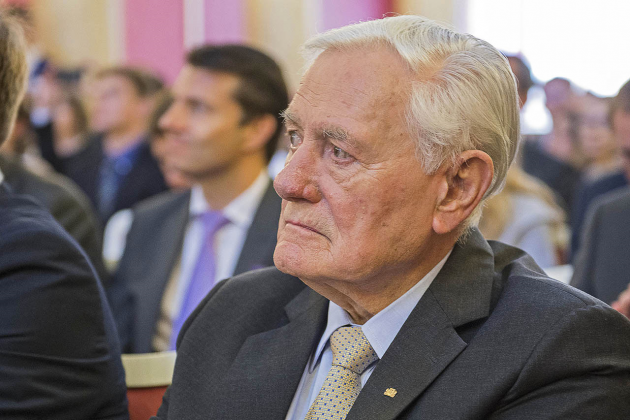
It is high time we made the necessary decisions. It is high time we embarked on the era of leadership of European values. Instead of distancing itself from decision-making, Lithuania should actively participate in decision-making that has a crucial effect on our transatlantic family, the region, and Europe at large.
Let me move on to raising a number of fundamental guidelines and foreign policy challenges for today’s discussion.
Our primary objective is to strengthen Europe. I sincerely believe that, together with the President of France, Chancellor Merkel, whose representative, a long-standing architect of German foreign policy, Mr Elmar Brok, is with us today, will be able to achieve this objective. Not only should we actively engage in the process, but also unite our efforts towards the development of various EU-building projects, and, of course, be in the midst of the process, if not in the front line. We need to play an active part in Brexit negotiations as well. Let me be frank: we must do all we can to minimise the size and effects of Brexit. I believe it is unacceptable to hide behind the backs of Brussels representatives, as we have been doing so far.
Today, one of the most important challenges for us all is to limit the negative influence of Russia on Lithuania, our region, and the whole EU. We have a wealth of military, energy, cyber and legal means to achieve this goal, but what we primarily need is to agree on this objective both in our region, in Brussels, and Washington. The fight against the Russian propaganda is, in principle, limited to national borders. We still lack strong regional projects that could become a real alternative to the Kremlin propaganda. We must prevent the involvement of corrupt Russian money in our political campaigns, and pre-empt any influence on our elections or decision-making in all areas, including the energy sector. Together, we could run investigations into such corruptive impact in order to subsequently prevent this from happening on the EU level.
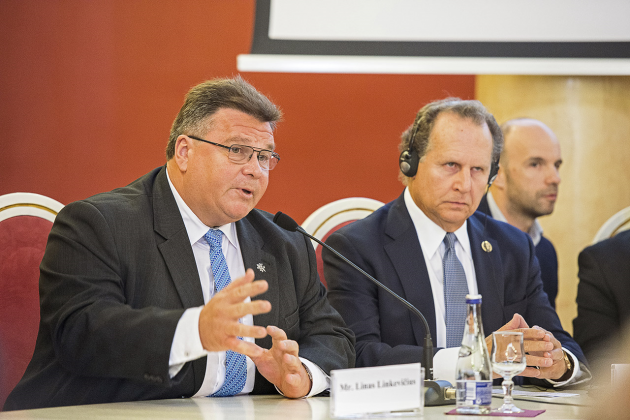
It is necessary to use all instruments available to secure the continuity of reform in Ukraine, Georgia, and Moldova. Real military aid to Ukraine as well as any other measures proposed by Washington, Brussels, or Nordic countries represented here, are thus very important. The ultimate goal of our activities has to be the membership of Ukraine, Georgia and Moldova in NATO and the EU, but let me repeat it again: we will be able to achieve this only by putting joint efforts to guarantee successful continuation of the reforms. Special mention should be made of Belarus. A long-term strategy and its consistent implementation aimed at making this country a genuinely European and democratic state is certainly a strong challenge that requires patient work and long-term efforts. At the same time, however, it is a vital task in ensuring security and prosperity of the region.
We must implement innovative solutions in the sector of liquefied natural gas and the strategic energy field to definitively consolidate democracy, i.e. freedom of choice of supplier and sources of energy, by dismantling the dominance of monopolies of third countries. I am now referring to Gazprom’s and Rosatom’s international empires. The first shipment of liquefied gas from the USA arrived in Klaipėda yesterday, and this is yet another significant step towards reaching this goal. We have to remain determined and complete building our gas network interconnections, synchronise electricity grids and eliminate the enormous threats such as the Astravyets NPP. It is essential that Lithuania raises not only the issue of Norstream2, but also the issue of Astravyets NPP in the European Council. Organising a meeting of political heads of the whole region dedicated to energy issues in order to identify new threats is also of critical importance.
With a view to achieving these goals, the Heads of States and Governments in the region could and should undertake new regional leadership initiatives and actively contribute to the development of our common region.
We must unite our forces in the area of cyber security as well. So far, we are taking just the first steps in our own countries. However, since this threat disregards State borders, we need to work on a global response and create new joint armed-forces units to cope with these threats.
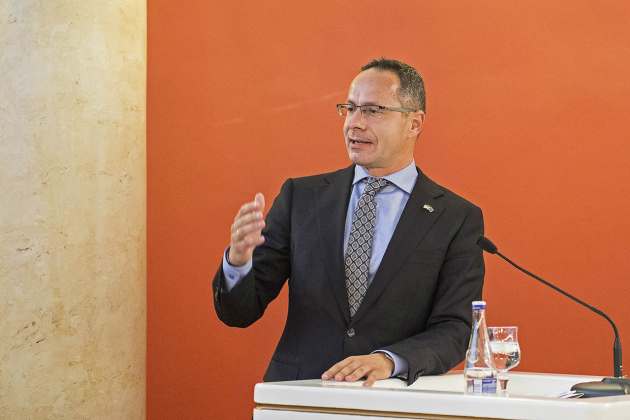
Finally, we should follow suit of our partners in the US, UK and Germany, and build institutes of strong party/political leadership. Our today’s partners, such as the McCain Institute and the International Republican Institute have excelled in this area, whereas we do not have such schools of systematic political and value-based leadership. We must establish such schools, or, alternatively, reinforce the existing foreign policy analysis centres together with our Western partners. One of the ways of doing this could be merging them into one joint school of regional strategic advanced studies, which would continuously create and develop the vision of the region and engage in the implementation of this vision. Possibly, the McCain Institute previously headed by Kurt Volker could refine the idea of this joint advanced academic institution with its branches in Vilnius, Warsaw, and Kiyv.
These are just a few reflections and ideas. I am convinced that we are going to hear more of them during the Conference. What I would like most is to turn ideas into deeds so that an increasing number of politicians in this region, in Europe and in the US take real responsibility and finalise the decisions that have to be taken without delay to make our world safer. In the language of metaphors, as citizens of the world, we are all in the same boat today. Any regional issue may spark a fire not only in the region, but in a large part of the world. Therefore, all of us need to do whatever we can for the sake of national, regional and global security, which starts right here, right now. It starts from words and deeds of each and every one of us.
I would like to make this Conference a traditional event in Vilnius. This would allow us to take a bird’s eye view and to evaluate new challenges to our transatlantic capacity and solidarity, the future of Lithuania, Europe and the whole world from the perspective of each individual country.
I wish to thank all of you who have contributed to the organisation of this Conference: Vilnius University and the Vilnius Club, the Eastern Europe Studies Centre, the International Republican Institute, the McCain Institute, the Ministry of Foreign Affairs, and Ambassador Žygimantas Pavilionis personally.
Thanks to you all. I hope that this joint step that we have made in Vilnius, Lithuania, will give an impetus to further development in Europe and the world. Let me thank all the participants, all the guests, all the good will politicians, states and governments, which, through supporting and encouraging each other, follow the path of historical and human values. I will go together with you as far as I can! Thank you!

Be the first to comment